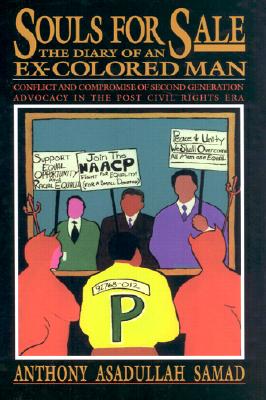Book Review: Souls for Sale: The Diary of an Ex-Colored Man
by Anthony Asadullah Samad
List Price: $35.00Kabili Press (Sep 01, 2002)
Nonfiction, Hardcover, 674 pages
More Info ▶
Book Reviewed by Kam Williams
“Between Black television shows and white-owned and controlled urban formatted radio that have little regard for Black cultural dignity and ethnic sensitivity, Blacks are projected to the whole world as gangstas, hoochies, fools and buffoons. The entertainment culture is only interested in making money, no matter what price Black dignity has to pay. This return to Amos n’ Andy type mimickery has Blacks looking ’real crazy’… and there is no shortage of black faces willing to play the fool for, what they call, entertainment’s sake. The manifestation of ’commoditized filth’ as scholar Maulana Karenga calls it, what the industry calls music, everybody else calls madness. A filth glorified for the riches it brings our youth, while making them social outcasts. The renewed hostility towards Blacks, framing of Black youth as maniacal and dangerously hostile, can be attributed to this genre’ of rap music.”
—excerpt from Souls for Sale
Before reading Souls for Sale: The Diary of an Ex-Colored Man, I was only familiar with Anthony Asadullah Samad as a syndicated columnist whose often incendiary op-ed pieces appear in many a periodical I choose to peruse.
While I’ve always found his articles insightful and illuminating, I had no idea whether he’d be able to hold my interest for well over 600 pages. But he achieves just that and more with as absorbing an autobiography as I’ve read in a long while.
Born Anthony Maurice Essex in 1957, Mr. Samad is a native of Los Angeles who was a second-generation black advocate during the period he calls the post civil rights era. In the 1980s, working for the NAACP in LA, he lobbied aggressively on every issue from police brutality to economic discrimination to government complicity in the proliferation of drugs, guns and gangs in the ghetto. And he rose rapidly in the ranks to become the organization’s youngest branch president.
What is most interesting about this book, however, is that the author doesn’t limit his bio to a self-serving listing of his considerable achievements. He makes some admissions of his failings and also points fingers as he sees fit. For instance, he discusses the folly of the LA/NAACP’s bestowing a Lifetime Achievement Award on Frank Sinatra, since the singer had been the first big-name, American entertainer to sing in Sun City, South Africa, and thereby support the racist apartheid regime.
Samad, as an insider at the time in question, is able to show how the NAACP had evolved to a point where it was willing to compromise its fundamental values in the interest of fund-raising. Since a Sinatra appearance would assure a sell-out at its annual dinner, the vote was to go with the dubious designee, despite the anticipated anti-apartheid demonstrations and other
shows of disapproval. Overall, the author paints a picture of an outfit
which had long since lost touch with the needs of the community it was supposed to be serving. The NAACP, it seems had come to be more responsive to the demands made of it by corporate donors than to the concerns of its rank-and-file minority membership. This did not sit well with Samad, who eventually left his position, not parting company on the best of terms.
Though he is currently a Professor of Political Science at East Los Angeles College, Souls for Sale covers many other intervening interludes on his way there, including a stint in prison (for making a false statement on a loan
application) and his conversion to Islam. Recommended reading for anyone ready for a well-written work which uncovers the ugly underbelly of issues many might consider almost heretical even to raise.
Related Links
50 Years after Brown: The State of Black Equality in America by Anthony Asadullah Samad
Book Review by Kam Williams
http://aalbc.com/reviews/50yearsafterbrown.htm

